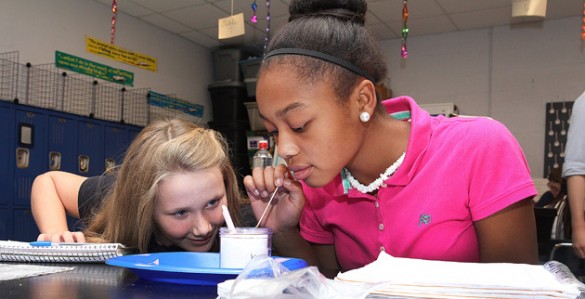Metropolitan Nashville Public Schools has joined with the Vanderbilt Center for Nashville Studies and Peabody College to create a platform to provide detailed, reliable and recurring information about the commitment of major employers to the public school system. This is the latest installment in a series that tells the story of collaborative involvement between members of the Vanderbilt community and local public schools.

Vanderbilt Student Volunteers for Science participants support science education in Metro Nashville Public Schools by bringing hands-on lessons to middle school students, including a popular one on how to make ice cream using liquid nitrogen. Over 20 years, these experiments have reached more than 71,000 children in 1,350 Metro Nashville classrooms.
Co-founded by Melvin Joesten, emeritus professor of chemistry, and a small group of dedicated medical, graduate and undergraduate students, VSVS was created based on the belief that school-aged students don’t fully appreciate science solely from reading textbooks. The organization’s model sends small groups of trained volunteers into middle school classrooms to conduct academically relevant science experiments four times each semester for the duration of the academic year for a total of eight lessons. This year, 540 Vanderbilt students are partnered with 110 classroom teachers in 10 schools.
“When we get to our classroom, we set up so that no more than two or three students are working at a station, so these really are hands-on experiments,” said Megan Covington, a Vanderbilt senior majoring in engineering who is co-president of VSVS. “And while we’re helping with the experiments, the teacher is there encouraging responses from the students and reminding the class about how the experiment is related to lessons they’ve already learned.”
Leandra Fernandez, also a senior majoring in engineering and a co-president of VSVS, said her parents, both engineers, enrolled her in hands-on science summer camps during her formative years. “When I first heard about VSVS, it sounded like something I loved to do when I was a kid,” she said. “Since I had all those opportunities to get interested in science and engineering, this feels like a chance for me to pay it forward to the next generation.”
Successful but not stagnant, thanks to full-time staff director Pat Tellinghuisen, VSVS has been able to change over time to ensure its partnership with Metro Schools stays relevant.
“When we first started, the experiments were geared more toward fun—making slime, making ice cream. But as the nature of how instructional time is spent in classrooms has changed, so has this program,” said Tellinghuisen, who is supported by the Department of Chemistry through the College of Arts and Science as well as through the Tennessee Space Grant Consortium. “[rquote]Every single experiment is absolutely relevant to what Metro Schools students are learning at that time and in that grade.”[/rquote]
It’s this sort of informed, responsive community support that makes Tonja Williams, principal at Head Magnet Middle School, welcome VSVS to her school. One of 10 middle schools with which VSVS is partnering this year, Head Magnet is also one of the founding partner schools.
“Head Magnet is a Rewards School in Tennessee, which means we are in the top five percent of schools across the state,” Williams said. “We are able to achieve this level of success because our teachers help our students to perform at their maximum levels. We use business partners like Vanderbilt to really help integrate real-world experience with our curriculum, which helps acclimate our students to the very highest standards.
“Additionally, [lquote]VSVS plays an integral role in building excitement around science. The impact of that excitement is increased student achievement.[/lquote] Working side by side with classroom teachers, VSVS helps our students reach their highest potential,” she said.
All involved agree that academic support and relevance is only a portion of what has made VSVS an effective program for two decades. Each session ends with time for Vanderbilt volunteers to answer questions about their own college experiences and the college admissions process. This aspect of the program, Tellinghuisen said, is “almost as important as the science we give the students.”
Williams agreed. “These visits really support our school’s—and district’s—emphasis on a college-going culture. They remind our middle school students that we aren’t just preparing them for high school, we’re preparing them to be successful in college,” she said. “They certainly see their teachers and their parents as role models for college, but when they see students who are closer to their own age come to work with them, that is a different kind of mentorship.”
Including VSVS activities such as one-time science events and afterschool programming, the organization’s reach into Metro Schools broadens to a network of 19 total elementary, middle and high schools. They include: Bailey Middle, Cameron Middle, Carter Lawrence Elementary Magnet, Eakin Elementary, East Literature Magnet, H.G. Hill Middle, Head Middle Mathematics and Science Magnet, John Early Middle, J.T. Moore Middle, Julia Green Elementary, Margaret Allen Middle, John Overton High, Rose Park Math/Science Magnet, Sylvan Park Elementary, Warner Elementary, Whitsitt Elementary, West End Middle, Westmeade Elementary and Wright Middle School.
Optional Schools Application process is Oct. 31-Dec. 3
Head Magnet Middle School is one of many Metro Schools participating in the Optional Schools Application process. Nearly 25 percent of Metro School students attend choice schools each year. The application dates for the 2014-15 academic year are Oct. 31 through Dec. 3. During this time, be sure to explore your options, visit schools and apply. Detailed information is available at www.mnps.org.
story by Whitney Weeks
whitney.weeks@vanderbilt.edu